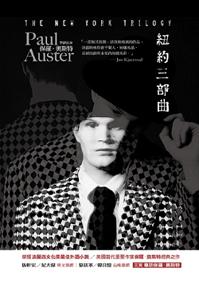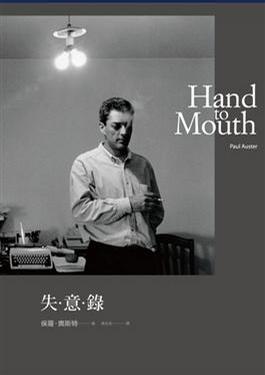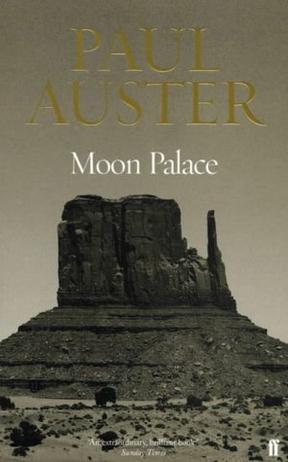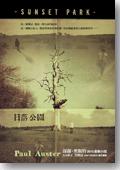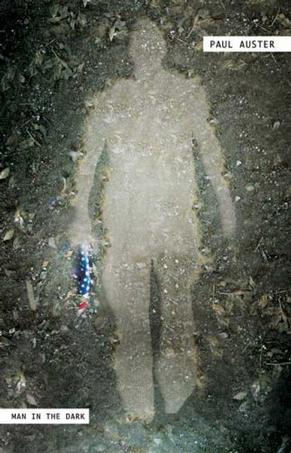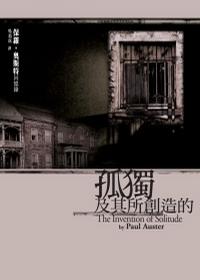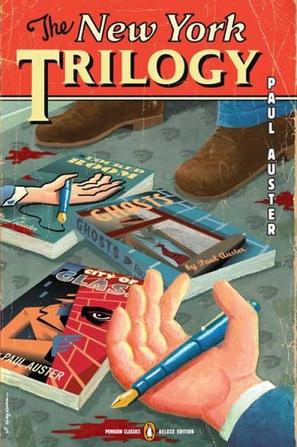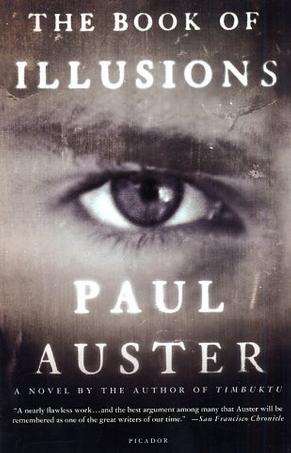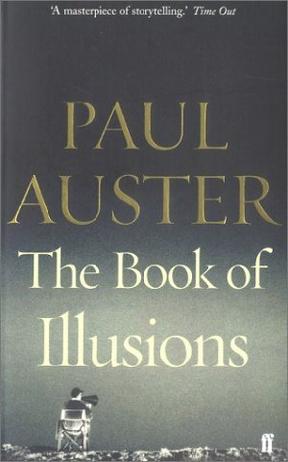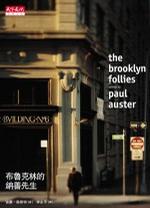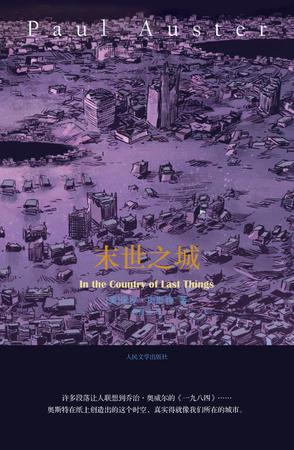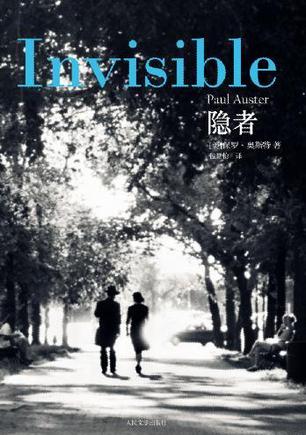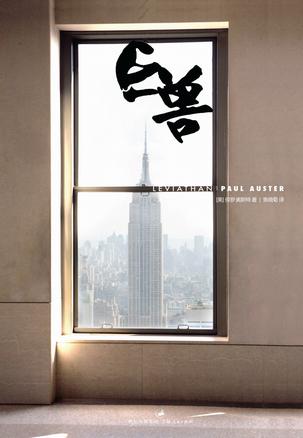欢迎来到相识电子书!
标签:Paul_Auster
-
紐約三部曲
榮獲法蘭西文化獎最佳外語小說 美國當代重要作家保羅‧奧斯特經典之作 版權售出三十餘國,全球長銷二十餘年 三段追索的故事,改寫了人類對存在的呼求 《紐約三部曲》由三個人物和三件任務組成,跳離了傳統偵探小說的解謎模式,用大膽、聰明的鋪陳,使真相如萬花筒般眩目迷離,藉以探尋身分、認同和存在的難題,開創獨樹一格的小說風格。 〈玻璃之城〉這一切,都從一通打錯的電話開始。匿名小說家化身為偵探,建立多重身分,在城市中追尋等待,然而他等到的卻是…… 〈鬼靈〉私家偵探「阿藍」日夜監視對街的「阿黑」,「阿黑」也從對街望向窗外。在監視者與被監視者之間,可能建立什麼樣的聯繫? 〈禁鎖的房間〉范修失蹤了,留下妻兒和作品,任由童年好友闖入他的生活,也一步步走進他謎樣的陷阱…… -
失意錄
這是一個作家站穩腳跟前的踉蹌歲月 也是一位青年成長為男人的人生試煉 本書是奧斯特近五十歲時的作品,回首高中時代至三十餘歲的人生。 這是他一生中最徬徨潦倒的歲月,卻也是影響他創作之路的關鍵時期。 學生時代就背棄世俗期望與規範、一心以寫作為志業的奧斯特,為了生計,做過各式各樣的零工、遇見形形色色的人物;也曾遠走他鄉,在不同的城鎮飽嚐寂寞的滋味。 他從男孩成為男人,又從男人成為父親;換過一個又一個工作,也遭遇一次又一次失敗。 在龐大的經濟壓力下,他不曾放棄寫作的夢想,卻也因為這樣的固執,他幾度跌倒,又必須爬起,才能逐漸在現實與理想的擺盪間,找到自己的人生位置...... -
日落公園
每一間棄屋,都是一則失落的故事 每一個傷心的人,都曾懷著希望與恐懼, 在這殘破荒敗之處靜靜等待…… 二十八歲的邁爾斯愛上了年僅十七歲的琵拉。她的姊姊威脅要告邁爾斯誘拐未成年少女,於是他倉皇逃到紐約,非法入住日落公園的廢棄公寓。 每天早上醒來,他都得面對被強制驅逐的恐懼。在破敗的生活中,他等待琵拉十八歲生日的那天,等待那不受控制的未來…… 奧斯特又一次翻轉小說與真實人生,翻轉我們的想像與解讀。 或許,或許那些被遺棄的物、靈魂與哀傷,是日落公園裡最珍貴的物事也不一定。──吳明益 -
Man in the Dark
Auster, a man of diverse creative achievements, defies convenient labels with regard to genre and the divisions between literary fiction and the mainstream popular marketplace. Given his experiences with such multimedia endeavors as National Public Radio's Story Project, it's not surprising that Auster has a flair for dramatic narration when performing his own work. As he gives voice to ailing retired book critic August Brill, Auster milks the story-within-a-story structure to full effect. Impatient listeners may wonder exactly where this disparate tale of revisionist history, war, marital disappointments and grief might be headed. But with the nuanced—yet palpable—use of inflection, Auster compels his audience to await the twists and turns. As an invalid with an active imagination and time on his hands, Brill makes his frailties tangible and emotionally compelling without descending into full-blown pathos. A Henry Holt hardcover (Reviews, May 26). (Aug.) Copyright © Reed Business Information, a division of Reed Elsevier Inc. All rights reserved. --This text refers to the Audio CD edition. A car accident and the death of his wife have left the retired book critic August Brill a physical and spiritual invalid. Virtually confined to his house with his recently divorced daughter and a twenty-three-year-old grandchild stricken with grief after the murder of her ex-boyfriend, Brill, an insomniac, attempts to stave off thoughts of death by telling himself bedtime stories. His tired mind weaves a tale that combines details of his life with more fantastic flights�such as the story of a man who, waking up in an alternate universe where 9/11 never happened and the 2000 election led to civil war, is sent on a mission to destroy the very person who has imagined him into existence. The narrative juxtapositions and the riddling starkness of Auster�s prose create an absorbing if mildly scattershot effect, breathing life into a meditation on the difference between the stories we want to tell and the stories we end up telling. Copyright ©2008Click here to subscribe to The New Yorker END ASIN:1400064759 ATTRIBUTE_NAME: 6800 SOURCE: From The New Yorker REVIEW: In her third novel, Sittenfeld offers a thinly veiled account (Wisconsin, not Texas) of the life of Laura Bush, in the story of Alice Lindgren, who marries Charlie Blackwell, the ne�er-do-well son of a political dynasty who becomes President. The early chapters, in which Sittenfeld depicts an innocent childhood and adolescence disrupted by tragedy, are the most compelling. As the book progresses to more recent and familiar events, she has difficulty enlivening the ins and outs of electioneering and policymaking. The object of Sittenfeld�s fascination is the seeming incongruity between Alice�s liberal sympathies and her bookish intellect and Charlie�s conservative nature and general insouciance. Neither character is very likable�Alice weak-willed and martyrlike, Charlie unbearably self-centered�but the novel, Sittenfeld�s most fully realized yet, artfully evokes the painful reverberations of the past. Copyright ©2008Click here to subscribe to The New Yorker END ASIN:1596915609 ATTRIBUTE_NAME: 6800 SOURCE: From The New Yorker REVIEW: This engrossing portrait of Virginia Woolf and the women who looked after her explores how modern ideas of class and gender crucial to Woolf�s writing ran up against her lingering ties to a waning Victorian domestic order. Woolf frequently pondered the �servant question,� but her concern for those she employed was tinged with distaste. �I am sick of the timid spiteful servant mind,� she wrote of Nellie Boxall, her cook for eighteen years. Though Woolf professed a desire for a time when masters and servants might be �fellow beings,� and argued in her work for space and autonomy for women, her life was one of dependence; she did not learn to cook until she was forty-seven. Light deftly �restores the servants to the story,� arguing that Woolf�s relationships with them were �as enduring, intimate and intense as any in her life.� Copyright ©2008Click here to subscribe to The New YorkerEND ASIN:0465011225 ATTRIBUTE_NAME: 6800 SOURCE: From The New Yorker REVIEW: Seierstad, the author of �The Bookseller of Kabul,� first visited Chechnya in 1995, shortly after Russian tanks rolled in. Twelve years later, as another war gave way to a dubious, corrupt peace, she returned, at one point hiding her blond hair and dying her eyebrows and lashes to sneak across the border. This is a chronicle of reciprocal destruction: Seierstad talks to Chechen rebels and to victims of Russian torture; to the mother of a terrorist and the mother of a maimed Russian soldier; to a family that lost four sons to the war and to street children who prove too damaged even for the �angel� of the title, who runs a home for war orphans. At times, Seierstad�s persona is intrusive; when the Chechen President praises her looks, she tells us. But she is a humane witness to a dehumanizing conflict, and recent developments in the Caucasus make her testament all the more timely. Copyright ©2008Click here to subscribe to The New Yorker END Reviewed by Jeff Turrentine One doesn't want to say it, and yet it must be said: Here we go again. Another elegantly slim volume, the perfect size for palming single-handedly while riding the Metro or sipping a double espresso. Another wild fictive device that demolishes the walls separating author, character and reader, leading to that familiar through-the-looking-glass feeling -- the one that blew you away when you first discovered The New York Trilogy, continued to impress you all the way up through Oracle Night, and maybe didn't even begin to wear thin for you until Travels in the Scriptorium. Another story that, in the end, turns out to be about storytelling. Another Paul Auster novel, that is. The Brooklyn-dwelling, 61-year-old writer still has his fierce champions; but, lately, championing Auster has come to feel more like defending him. Even in the most flattering reviews, critics have begun to express fatigue at the way he continues to rely on the same hall-of-mirrors approach to narrative design in novel after novel after novel. The man is a magician, indisputably, and his magic is still capable of dazzling. But over the course of 23 years, a lot of his readers have figured out the secret to his signature trick, and it's gotten to the point where some of those Austerian tropes have lost their otherworldly luster. The trick works best when it's in service to a feeling rather than an idea, which is to say when Auster treats his characters like human beings rather than symbols. In Man in the Dark, his latest, the author has struck the right balance: Here is a novel that opens with chilly existentialism -- "I am alone in the dark" -- and winds its way through a surreal Borgesian labyrinth before ending tenderly, and humanely, with a grandfather and granddaughter keeping each other company during a long, sleepless night. As was the case in The Brooklyn Follies (2006), which, like this novel, featured a man in his twilight years recollecting a life that could have gone a little better, Auster is attempting real portraiture, not merely the Escher-print trippiness that has earned him a spot on every freshman English major's dorm-room bookshelf since the late 1980s. Man in the Dark still manages to be pretty trippy, though. August Brill, a retired book critic who has moved in with his divorced daughter and adult granddaughter, deals with his chronic insomnia one night by making up a story about an ordinary man thrust into a parallel reality, one in which America is embroiled in a civil war brought about by the disputed presidential election of 2000. Brill names his character Owen Brick, and he begins Owen's story by having him wake up in a deep pit wearing a soldier's uniform. After being rescued by another soldier, the befuddled Brick learns that he has an important mission: He is to travel to Vermont and assassinate a man named August Brill, who has recklessly invented this crumbling, war-torn alternative America using nothing but his insomniac's imagination. "There are many worlds, and they all run parallel to one another, worlds and anti-worlds, worlds and shadow-worlds, and each world is dreamed or imagined or written by someone in another world. Each world is the creation of a mind." So Brick is informed before being sent off to kill his creator, our narrator. Auster, of course, is as much at home in these roiling metafictional waters as Michael Phelps is in a swimming pool. And it's certainly fun to play along, wondering -- with Brick and his author(s) -- how things in this weird multiverse will play out, as Brick edges ever closer to his target. Or is the target moving toward Brick? Then Auster does something he might not have done in his younger days, back when he stayed up obsessing over story structure rather than musing on those topics that keep older men awake all night. Three-fourths of the way through Man in the Dark, the magician cuts short the act, calls up the house lights and explains the whole trick. Brill is visited in the dark by his grieving granddaughter, who owes her crippling heartbreak to a war that readers will recognize, sourly, as belonging to the real world. The code of Owen Brick is slowly cracked, as we begin to see how the figures, events and emotions in August Brill's life have been converted into the vocabulary of his waking dream. "Stick to the story," Brill tells himself at the beginning of his sleepless night. "That's the only solution. Stick to the story, and then see what happens if I make it to the end." It wouldn't be an Auster novel without such moments of cheeky narrative reflexivity. But all the paradoxes, coincidences and origami-like plots -- the elements of this author's unique style -- really do add up to something more than trickery. Shortly before dawn, his insomniac concludes: "The real and the imagined are one." Maybe every story, Auster seems to suggest, turns out to be about storytelling, and maybe every storyteller is telling his or her own. Copyright 2008, The Washington Post. All Rights Reserved. Reactions to Paul Auster’s new novel may very well have come from alternate universes themselves. In one world, Auster is a great American man of letters writing a postmodern response to the events of our time, particularly 9/11, as only he can. In another world, his novel is yet another failed attempt at fictional engagement with the past eight years. There is a universe where Auster has matured from a young writer with a genius for multilayered, self-referential plots to a more sensitive observer of human suffering and the stories we tell to save ourselves. Yet others see a world where Auster is playing exactly the same games he has for years, only with less-developed characters and a half-hearted attempt at social commentary. It may be that readers, like Auster’s characters, will have to invent their own stories in order to make any sense out of Man in the Dark. Copyright 2008 Bookmarks Publishing LLC "Probably Auster’s best novel."—Kirkus, starred review "Astute and mesmerizing."—Booklist, starred review "This best-selling author with a cult following of literati finally offers one to please both fan bases."—Library Journal, starred review "This is perhaps Auster’s best book. But maybe that’s an unfair description. Man In The Dark is so unlike anything Auster has ever written that it doesn’t make sense to compare it with his earlier work. Sure, you can recognize the author of ‘Oracle Night’ and ‘Brooklyn Follies.’ But it’s as if that gentle mind has been joined by the ghost of Kurt Vonnegut, the adamant pacifist, author of ‘Slaughterhouse Five’ and creator of Billy Pilgrim, a prisoner of war who became ‘unstuck in time.’ Here we have multiple worlds and three generations, also unstuck in time. But like Vonnegut’s classic anti-war novel, Auster’s book leaves one with a depth of feeling much larger than might be expected from such a small and concise work of art."—Stephen Elliott, San Francisco Chronicle "In one thread, an ailing 72-year-old named Brill convalesces in Vermont; in the parallel and more eventful thread, a man named Brick wakes up in a dangerous dream—America currently in the middle of a 21st-century civil war. Both plots are propulsive. . . . [Auster is] a master of voice, an avuncular confidence man who can spin dark stories out of air."—Entertainment Weekly "[Auster’s] magic has never flourished more fully than it does in Man In The Dark. . . . The novel delivers intense reading pleasure from start to finish."—Chauncey Mabe, Orlando Sentinel "Vivid and arresting. . . . a novel that manages, admirably, to be both apocalyptic and tender. . . . The universe conceived by Auster is a world worth entering. And all that Brill struggles to forget in the pages of Man In The Dark translates into a book that deserves to be well remembered."—St. Louis Post-Dispatch "Auster is after something entirely different, in this haunting and beautifully crafted work, than speculative fiction. . . . This superb small novel isn’t, despite initial impressions, about war or politics at all. It is about, in the face of guilt and horror, choosing whether to die and how, if that is the choice, to live. It is, at heart, about the stratagems that we, but in particular our best novelists, devise as a means of keeping us going in the face of the ‘pitiless dark’ that will swallow us all."—Popmatters.com "Man In The Dark . . . crashes onto shore with a great burst. It suddenly adds up, and what it adds up to can leave you sleepless."—The Buffalo News "[A] fascinating new novel. . . . As Auster reminds us, often the worst wars are those fought in one’s own mind."—MSNBC.com "Paul Auster’s twisty Man In The Dark concerns an alternate universe where two planes never toppled the World Trade Center. But Bush is still president, and a civil war rages in America. . . . Takes us closer to understanding the emotional wreckage [of 9/11]."—GQ "The real magician here is Auster. Our new century so far has been as bleak and troubled as Brill’s last years. This little dream of a novel invests it with something newly precious. Hope riffles the pages of this beautiful, heartbreaking book."—Paste "No writer is working harder than Auster to give America an existential literature to call its own, and Brill has a ruminative and slightly despairing mood that recalls Camus’ antiheros. Yet Man In The Dark isn’t a headlong leap into emptiness . . . Auster treats the theme of isolation straightforwardly, studying the emotional costs of war through Brill’s own vivid memories and his family’s own recent heartbreak. In the process, he arrives at the provocative notion that war stories and love stories aren’t as different as we might like to think."—Washington City Paper -
孤獨及其所創造的
《孤獨及其所創造的》是保羅.奧斯特的回憶錄。奧斯特的寫作生涯初期十分潦倒,父親驟逝、婚姻失敗。他在這個時期完成了本書,對父親的身分和創作的孤獨,有著毫不躲藏地自我沉思和環環相扣的精準隱喻。其中,〈一個隱形人的畫像〉描述作者接到父親死訊之後,對父親的回憶,文字細膩,充滿戲劇般的張力,故事詭譎,引人入勝。 作家的父親活得像個隱形人, 他去世時,人們覺得他彷彿不曾活過。 作家回到老家,整理父親的遺物, 此時他才逐漸解開 這位隱形人的畫像為何如此孤獨......。 十五年來,他一直獨居,頑強、魯鈍,彷彿不受這個世界影響。他不像一個佔據空間的人,到像以人的形式出現的一塊無法貫穿的空間。這個世界自他身邊彈開,在他面前碎裂,有時依附著他——但不曾貫穿他。十五年來,他經常獨自一人在一棟巨大的房子出沒,也在那棟房子裡離開人世。——保羅.奧斯特 -
The New York Trilogy
Paul Auster’s signature work, The New York Trilogy, consists of three interlocking novels: City of Glass, Ghosts, and The Locked Room—haunting and mysterious tales that move at the breathless pace of a thriller. -
我曾以为父亲是上帝
★保罗•奥斯特——美国最富创新精神的小说家与美国最大的广播电台NPR联手合作,收集那些散落在美国民间的真实故事。 ★来自美国各地、各行业、各年龄层次的179位真性情作者,用他们的私人故事,讲述生命中那些无法招架的爱。 本书源自保罗•奥斯特与美国国家公共电台合作的节目“全民故事计划”,来自美国各地、各行业的平凡人参与投稿,保罗•奥斯特从四千份来稿中精选出179个故事成书。令人捧腹的趣事,曲折离奇的巧合,令人心碎的别离,奇迹似的相遇,难以解释的梦境……179个精彩的私人短故事,讲述了人生中变化无常的伤痛和永恒不变的爱,共同建成了这座“美国现实生活的博物馆”。 一本震撼人心的书,在书中,一些陌生人与你分享他们最深的秘密,他们最愉悦的回忆,他们的恐惧和遗憾。读这些文字就像看进人的内心,以不同的视角审视生命,以另外的方式体验生活。 ——《波士顿环球报》 很难想象今年出版的别的书,或是明年将出的任何书,能如此简单、显眼,又能有如此精彩的内容和优雅的技巧,将人类生活的智慧和知识以丰富的细节展示出来。同样,也很难想象有哪一本书能如此严酷地提醒我们,生命能这么可怕而且难以置信,从而精准地回答了我们当今的需求和困境。 ——《卫报》 终于,有了一本具有获普利策奖潜质的休闲读物:这本书惊人、令人上瘾,其中收集的这些一到三页篇幅的故事是绝对的珍宝。 ——《美国出版人周刊》 正如本书所证明的那样,我们都将经历写进了故事当中,而奥斯特本人在把这些故事整理成章的过程中,也说了一个好故事。强烈推荐阅读此书。 ——《图书馆杂志》 令人难忘的人类乐观之书。从美国各地而来的感人、有趣的简讯。 ——《美国周刊》 这是一部杰作。我读过保罗•奥斯特的许多书,这本书虽然不是他写的,但却跟他对命运的神秘与曲折的想象不谋而合。书里的故事引人入胜,时而感动人心,时而引人大笑。 在肤浅的故事情节和预先包装好的娱乐小说获得如此多注意力的今天,读到这些令人不可思议而真实可信、发生在平凡人身上的故事,令人耳目一新。 我是从图书馆借来看这本书的,但我买下它,是因为我希望我能一遍遍地重读。 ——美国亚马逊书店读者,埃里克•范内沙 -
布魯克林的納善先生
身罹癌症、家庭破碎的中年男子納善,退休後特意搬到布魯克林定居,打算孤老一生,卻沒想到布魯克林才是他人生的起點…… 納善開始探索布魯克林的一切:街角的餐館、餐館的女服務生、商店的老闆,甚至與失聯多年的外甥湯姆重逢。在與同樣失意的湯姆攜手探索新生活之餘,納善逐漸發現身邊的小人物們,若不是有不堪回首的過去,就是有徒具空殼的生活;但他們都選擇了布魯克林止痛療傷、重新開始,這些小人物的命運,也逐漸與他的人生交纏…… -
黑暗中的人
七十二岁的书评家奥古斯特·布里尔遭遇车祸,在女儿家修养,却常常失眠。为了打发漫漫长夜,更为了遗忘妻子去世和外孙女男友泰特斯横死他乡的悲痛,他躺在床上给自己讲故事。在他想象的世界里, “九·一一”事件没有发生,二〇〇二年的总统大选造成美国分裂,新的内战爆发了,而士兵布里克被迫执行的任务,就是杀死讲故事的人…… 布里尔渐渐向外孙女敞开心扉,讲述自己荒唐的婚外恋,也触及泰特斯遇害的真相。两个同命相怜的人在讲述故事中互相医治心灵的创伤,寻找生活的光明,也让读者庆幸在残酷的世界中还存在寻常的快乐。 -
末世之城
村上春树最喜爱并亲笔翻译其作品的美国当代大师! 保罗·奥斯特版的《一九八四》! 比世界末日更深沉,比冷酷异境更死寂! 令我感到怪异的, 并不是一切都逐渐分崩瓦解, 而是还有那么多事物 依旧存在。 已经有多久了?我来到这里,已经有多久了呢? 为了找寻失踪的哥哥,我搭上一艘船,告别了你,来到这个绝望的所在。时间在这里就像一缕触摸不着的幽魂,我什么也感受不到,除了虚无和哀伤。 我怎么也找不到哥哥,却遇见了哥哥的同事山姆,我们一同追忆往日的时光,也慢慢地爱上了彼此。山姆说有天要带着我逃离此地,重返记忆中的美丽世界……我想那是我听过的最动人的承诺,也是我所愿意相信的一切。 你知道吗?我可以感受到周遭的事物正逐渐分崩瓦解,同时又确信还有什么依旧存在。所以我必须写这封信给你,当此城不复存在,当记忆消逝无踪,我相信你永远都会保留我的只字片语——关于我这么努力存活的具体证据…… 《末世之城》是保罗·奥斯特用文字演奏的命运交响曲,故事的主角安娜被困在一个宛如绝境的孤城,在机缘巧合下,经历了一连串关于希望与绝望、乐观与悲观、失去与存在的生命难题,也在这段最幽暗的时光中,认识了最勇敢、最真实的自己…… -
隐者
一九六七年春,纽约:二十岁的哥伦比亚大学学生、诗人亚当·沃克结识神秘的法国学者鲁道夫•波恩和他沉默、迷人的女友玛戈。亚当迅速爱上玛戈,却发现自己陷入了一个古怪的三角关系,它最终导向一件骇人的暴力突发事件,就此改变了他的人生轨迹。 《隐者》从三位叙述者的角度拼贴出一个惊心动魄的故事,从一九六七年到二〇〇七年,从纽约到巴黎,到遥远的加勒比海岛。这是一个关于欲望的故事,也是一段追求正义的旅途。 保罗·奥斯特以其犀利的洞察力,带领读者游走于真相与记忆的边界,写出又一令人难忘的力作。 -
巨兽
与《月宫》《纽约三部曲》并称三大代表作 美国当代小说家保罗•奥斯特风格最强烈的政治寓言 满怀理想的他,终将面对时代的巨兽奋力一搏 美国图书馆学会最佳图书 法国文坛最高荣誉麦迪西文学大奖 “六天前,一名男子在威斯康星州北部的一条公路边将自己炸死……” 这个由彼得•阿伦讲述的故事就这么开始了,故事的主人公是他的挚友本杰明•萨克斯。十五年前的一场作品朗读会,让两人结为莫逆之交,并在创作上相互提携。萨克斯拥有令彼得嫉妒的婚姻,拥有令彼得羡慕的智慧。然而一次意外的坠楼事件差点要了萨克斯的命,之后他就失踪了。再次见面时,彼得发现萨克斯就是破坏全美各地自由女神像的“自由幽灵”。现在,彼得必须将导致萨克斯之死的人生线索拼接起来。他惟一的目标,是在案件调查员公布所谓的“真相”报告前,抢先将事实经过讲述出来。 -
纽约三部曲
《玻璃城》、《幽灵》、《锁闭的房间》被称为纽约三部曲。它不是传统意义上的侦探小说,奥斯特通过营造哥特式的紧张气氛,设置一个又一个悬念来诱使读者与之一起踏上追寻身份和存在意义的心灵之旅。 玻璃城:深更半夜,一个陌生电话打到侦探小说作家奎恩家里,这让他陷入了比任何侦探小说更为扑朔迷离的案情之中。 幽灵:布鲁受雇于怀特去监视布莱克。监视,跟踪,一年过去了,他一无所获,布鲁几近崩溃。 锁闭的房间:一封不期而至的信,告诉“我”——范肖的童年好友,范肖失踪了,留下妻儿和一堆非同寻常的手稿。按照范肖以前的意愿,“我”被要求处理这些手稿。起初一切很顺利,范肖的手稿得以出版。与此同时,我娶了范肖漂亮的妻子,做了范肖儿子的父亲。然而,“我”突然发现范肖竟然还活着!
热门标签
下载排行榜
- 1 梦的解析:最佳译本
- 2 李鸿章全传
- 3 淡定的智慧
- 4 心理操控术
- 5 哈佛口才课
- 6 俗世奇人
- 7 日瓦戈医生
- 8 笑死你的逻辑学
- 9 历史老师没教过的历史
- 10 1分钟和陌生人成为朋友

